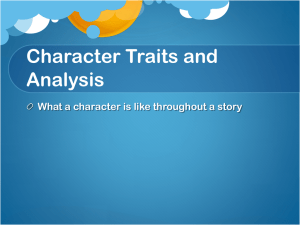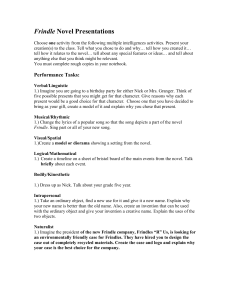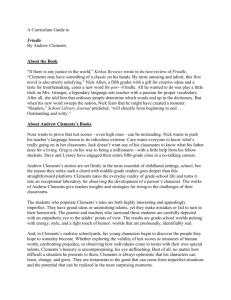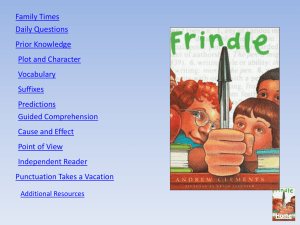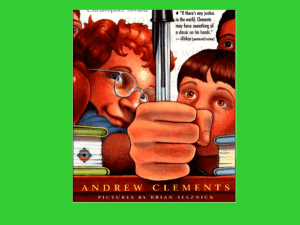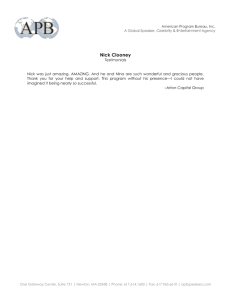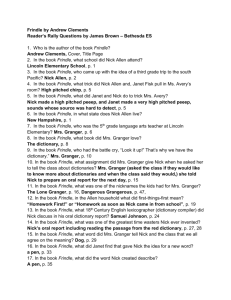Frindle Literature Circle Guide: Questions & Summary
advertisement
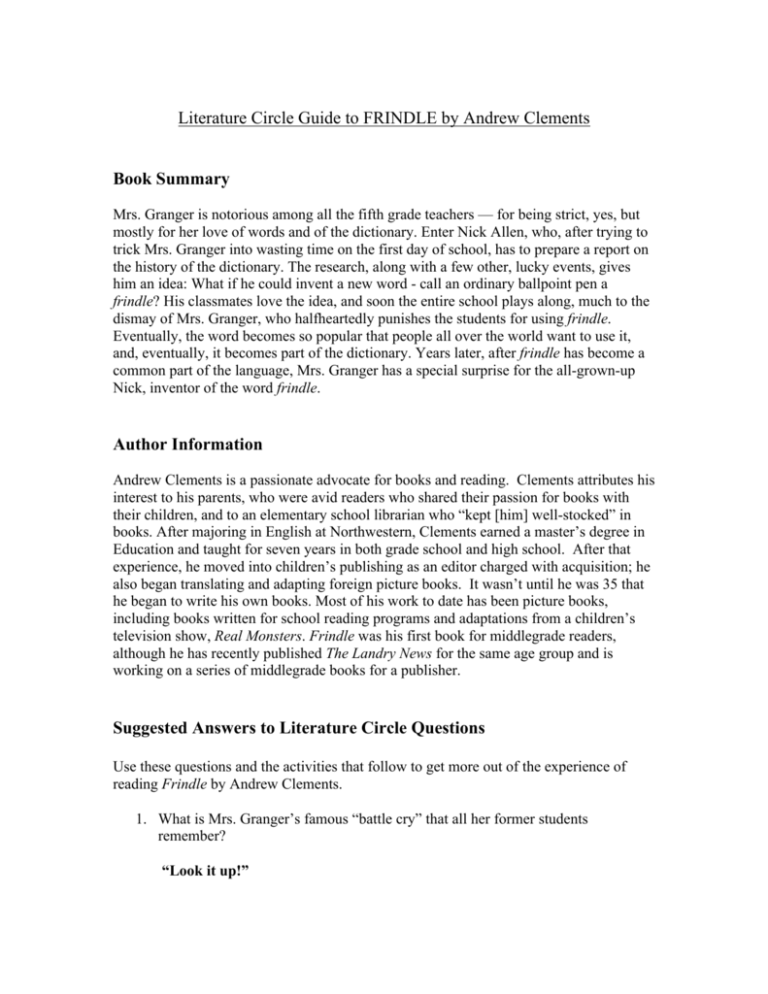
Literature Circle Guide to FRINDLE by Andrew Clements Book Summary Mrs. Granger is notorious among all the fifth grade teachers — for being strict, yes, but mostly for her love of words and of the dictionary. Enter Nick Allen, who, after trying to trick Mrs. Granger into wasting time on the first day of school, has to prepare a report on the history of the dictionary. The research, along with a few other, lucky events, gives him an idea: What if he could invent a new word - call an ordinary ballpoint pen a frindle? His classmates love the idea, and soon the entire school plays along, much to the dismay of Mrs. Granger, who halfheartedly punishes the students for using frindle. Eventually, the word becomes so popular that people all over the world want to use it, and, eventually, it becomes part of the dictionary. Years later, after frindle has become a common part of the language, Mrs. Granger has a special surprise for the all-grown-up Nick, inventor of the word frindle. Author Information Andrew Clements is a passionate advocate for books and reading. Clements attributes his interest to his parents, who were avid readers who shared their passion for books with their children, and to an elementary school librarian who “kept [him] well-stocked” in books. After majoring in English at Northwestern, Clements earned a master’s degree in Education and taught for seven years in both grade school and high school. After that experience, he moved into children’s publishing as an editor charged with acquisition; he also began translating and adapting foreign picture books. It wasn’t until he was 35 that he began to write his own books. Most of his work to date has been picture books, including books written for school reading programs and adaptations from a children’s television show, Real Monsters. Frindle was his first book for middlegrade readers, although he has recently published The Landry News for the same age group and is working on a series of middlegrade books for a publisher. Suggested Answers to Literature Circle Questions Use these questions and the activities that follow to get more out of the experience of reading Frindle by Andrew Clements. 1. What is Mrs. Granger’s famous “battle cry” that all her former students remember? “Look it up!” 2. What question does Nick ask Mrs. Granger on the first day of class to stall the lesson? How does she outsmart him? Expecting Mrs. Granger to give a long, detailed explanation about her beloved dictionary, he asks her where “all those words” come from. Instead of answering Nick, however, Mrs. Granger tells him to do some research of his own and prepare an oral report to deliver to the class the following morning. 3. List the three important events that lead to Nick's big idea: renaming a pen a frindle. First, his friend Janet finds a fancy gold pen lying in the street. Second, he is reminded of a discussion he had earlier in the day with Mrs. Granger. After delivering his report on the history of the dictionary, she had asked him, “Who says [the word] dog means dog?” and asserted, “You do,” a response that, at the time, confused Nick. Third, he remembers that, as a kid, he used to call his music cassette player a gwagala, a name that he had made up, but for three years of referring to the player as gwagala he was able to convey to his parents that he wanted to hear music. 4. What exactly does Mrs. Granger mean when she says that “dog” means dog because we all agree it does? Possible answer: Rather than using the word “dog” because the dictionary tells us to, we use that word because other people use it, recognize it, and know what it means. So, instead of the dictionary being used as a book of laws governing our language, it is more like a record of the words and speech we use to describe the world around us. This is why the dictionary often changes to include new words and even slang. 5. Why do those students want to stay after school and be punished by Mrs. Granger? Why do they consider it a “badge of honor”? The students sense that a battle is being waged between Mrs. Granger and Nick over the use of the word frindle, and perhaps they want to take sides. Perhaps they sense that something exciting is taking place, and they want to be a part of it. Also, it can be fun to rebel against teachers, especially when it seems they’re using a word that’s a creative and harmless alternative to the standard, boring “pen.” 6. If “ain’t” is not a proper word, how can it be in the dictionary, as Nick points out? What is Nick trying to prove when he brings this point up with Mrs. Chatham, the principal? Mrs. Chatham points out that the role of a teacher is to discourage her students from using incorrect grammar, such as the word “ain’t.” But even though this word is not grammatically correct, it exists in the dictionary, just as any other word does. Perhaps Nick is trying to open Mrs. Chatham’s mind about the uses of the dictionary, and to show that what he’s trying to do by using the word frindle is not meant simply to annoy his teacher. It is a creative experiment in language. 7. Imagine that you are the reporter from the Wakefield Gazette, trying to get the scoop on the new word frindle. What questions would you ask Mrs. Granger? How would you convince the principal to give you the real story? Suggested questions for Mrs. Granger: - How have the other students reacted to Nick’s frindle campaign? Isn’t this the kind of creativity a teacher wants to encourage? What is the purpose of keeping kids after school as punishment, especially if the punishment doesn’t seem to be working? Is a new word something one person can single-handedly stop? Hasn’t it taken on a life of its own? Suggested questions for the principal: - Explain Mrs. Granger’s reputation within the school, among the students. What kind of student is Nick? What do you think his motives are — to only cause trouble? Might there be a better reason, an educational or philosophical reason? Explain the thinking behind Mrs. Granger’s punishment — is this effective? Can I talk to Nick and some of the other students? 8. Bud Lawrence wants to own the copyright for the word frindle. What does he plan to do with it? How can someone own the rights to a word? Explain how this is different from owning a bike or a pair of sneakers, or even a pet dog. Bud Lawrence doesn’t want to own the word; he wants to make and sell pens and call them frindles, taking advantage of all the publicity surrounding the word to make money. If a person invents a word, he or she can sometimes protect that word under the law so someone else doesn’t make a product and call it by that name. This is different from owning a pair of sneakers or a pet dog because a word is not a physical object that one wears on their feet or plays catch with. One does not keep a word in his or her possession. If someone else wants to use that word for advertising — such as the way Bud Lawrence wants to use frindle to sell his pens — then he has to pay money to the person who invented the word and has had the law protect it. For example, the word Kleenex is protected by law, a copyright. If you wanted to start your own tissue company you could not call it Kleenex. However, sometimes even a copyrighted word becomes a commonly used word, such as how many people call a cola a Coke or tissues Kleenexes. 9. When the reporter from the TV station asks Nick, “What’s next for you and your new word?” Nick replies that frindle belongs to everyone now.” How can a word belong to everyone? What does someone “do” with a word that belongs to them? What Nick means is that people can use the word however they please — in poems, in stories, in conversations, in songs. They can turn it into a verb — Instead of saying “I like to write,” someone might say, “I like to frindle.” Words are not private possessions; people may use them however they wish. 10. How does the experience of inventing a new word and becoming a celebrity affect Nick? Why does he think twice about testing out his new idea: protesting the poor food in the cafeteria? Nick realizes that an individual can be very powerful when he or she chooses. However, with power comes the need for responsibility. Nick knows that if he started a boycott of the cafeteria food, there’s a good chance it might work! This could be a good thing, because it might mean that the school starts serving better food. However, it would also create consequences that Nick is not prepared for, such as cooks losing their jobs, and kids having to bring their sack lunches every day and inconveniencing their parents. 11. In her letter to Nick (which he opens years later, after he’s in college), Mrs. Granger says: “A person can watch the sunset, but he cannot slow it down or stop it or make it go backward.” What do you think this observation has to do with Nick’s word? Like Nick’s word, a sunset cannot be controlled by people; we can merely watch it and marvel at it. Mrs. Granger, though she plays the role of the villain, secretly enjoys watching the progress of the word — as it becomes more and more popular — just as she enjoy watches the sunset. She knows she cannot control the progress of frindle even as she pretends to want to stop it. 12. Why does Mrs. Granger “expect to hear remarkable things” about Nick in the future? Can you predict — based on his creativity and his restless challenging of rules and conventions — what kind of remarkable things he might go on to do? Teachers can discuss the fact that Nick is creative, thoughtful, unafraid to challenge the rules in a productive and healthy way. Nick is smart, but he is not a teacher’s pet — he does his own thing. But he is responsible — he pushes hard for frindle to become a real word, but, for instance, he sits out boycotting the cafeteria food because he knows that there could be consequences for which he’s unprepared. He believes in his cause a great deal. One can imagine that, given Nick’s creative way of thinking, he might go on to invent something the world needs, or perhaps start a business. The way he led the campaign for the word “frindle” suggests that he’s a gifted, natural leader of people. Other kids like him, trust him, are inclined to follow him — even if it means having to stay after school! 13. Can you recall the early parts of the story and Mrs. Granger’s “war” against Nick and his new word? Now that you know what her real intentions were — to intentionally make herself “the bad guy” — try to imagine what she was thinking when she posted her angry notice, or when day after day she kept all those students after school. Your students should be able to relate to the idea that it’s fun sometimes to rebel against the rules, especially when they seem silly and unreasonable. Likewise, you can discuss why some of those rules are important, and why it is necessary, sometimes, for a teacher like Mrs. Granger to maintain order. After realizing that Mrs. Granger’s intentions were to help frindle become a real word, then perhaps posting the angry notice was a way of uniting the students against her own silly policy. She perhaps realized that students love to rebel, and that the angrier she seemed in the notice, the sillier she sounded. Perhaps keeping all those students after school was a similar technique: it was a way to punish students — because she had to pretend that she wanted them punished — without doing anything that would be too severe or would break their spirits. 14. Do you think Nick really knew what he was getting into when he started spreading the word frindle? How did Mrs. Granger — who tried to make obstacles for Nick — realize the possibility of Nick’s new word? Students will probably suggest that Nick was smart and deliberately wanted to challenge Mrs. Granger, but that he was very lucky to receive all the publicity he did, to have so many people willing and instrumental in making the word popular. Even though it’s unlikely that Nick knew entirely what he was getting into, he seemed to have a hunch that he was onto something special — people liked the word, the idea behind it; the people who read the newspaper articles about Nick and saw him on television seemed to like the story, that it came from the mind of one kid. Mrs. Granger, on the other hand, knew something about how words come into the language, and perhaps realized that, although unlikely, Nick’s new word was taking a course not unlike other words in history, words that had long ago become part of the language. Note: These literature circle questions are keyed to Bloom’s Taxonomy: Knowledge: 13; Comprehension: 4-6; Application: 7-8; Analysis: 9-10; Synthesis: 11-12 ; and Evaluation: 13-14. Activities 1. Nick gets the idea for inventing a new word partly from a word he used as a baby, gwagala — his word for music. Are there words that you invented as a baby, before you could read and learn the actual words? If you can’t remember, ask your parents or brother or sisters. Have students conduct “interviews” with their families to find out what kind of words they used as babies. They might be surprised by what they find out. The next day in class, you can play a game by listing the words on the board — without the meaning — and having the rest of the class try and guess what the word describes. 2. Draw a picture that will serve as an advertisement for a frindle. What will it look like — an ordinary pen, or something more unique? Come up with a catchy phrase so people will start using it. What famous people or celebrities might you get to endorse it? Use elements from the story in the advertisement: Show, perhaps, an angry Mrs. Granger disapproving of the use of frindle or all the kids staying after school writing with a frindle. The tag line could be: “If you have to write the same word over and over again as punishment, wouldn’t you rather do it with a frindle than a pen”? Have the students think of the celebrities that would be least likely to endorse a frindle and incorporate them into the ads. 3. Do you have any teachers like Mrs. Granger, who made life difficult for you as a student, but whom you came to appreciate later on? What important lessons did they teach you that you didn’t want to learn? How did their being strict pay off for you? Write a letter to an old teacher, like Nick does, telling them all the important things you got out of their class. You don’t have to send it, of course, but see if you surprise yourself with how much you actually learned from them. Students might need some help coming up with the teachers that weren’t the most popular or the ones they liked the most, but the ones who challenged them, made life a bit difficult by pushing them to be creative, to work and try harder. Discuss, again, the importance of a teacher like Mrs. Granger, who may seem strict and challenges Nick, but who, in the end, provides the crucial motivation for Nick to keep going in his campaign for his new word. In the letter, students can remind their former teachers how much progress they’ve made since they were in their class.
